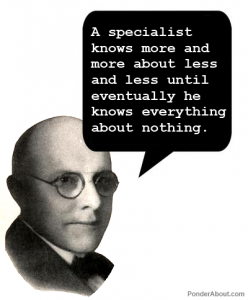It’s that point in the year when I’m struggling. I’m currently teaching 3 different courses (two of which I’ve never taught before), heading up the drama club, and helping to coach our senior boys basketball team. While it may seem like I’ve bit off more than I can chew, it’s exactly the giant mouthful that is sometimes required when working in a small school. More often than not, I love being as big a part as possible in the school community, but every so often you feel stretched thin and wonder how much better you might be at one passion if you were given the time needed to really pursue it. I could go on and on about how this affects my practice and planning, etc. (and I’m sure I will in another post very soon), but right now I’m just wondering what’s in the best interest of students.
I should begin by saying that I am all for a well-rounded education that goes beyond simply academics and highlights the interdisciplinary aspects of life. I love helping students take risks to uncover talents or sides of their personalities that had yet to be explored. But I do wonder when I’m planning a course or a unit, or hearing about the courses that students want to take versus those they HAVE to take, or I see a student wishing they could focus more on their passion (be it sport or art or otherwise) rather than being pulled into some level of mandatory co-curricular program that only allows them a brief taste of lots of flavours, if we’re striking the right balance for our students. Is there a right balance, or is balance always the right answer?
I’m sure the answers to these questions are as varied as our students themselves. Some may honestly not know what they want and, for these students, generalization is essential to helping them understand their options and keep as many doors open. Others may have clearly identified a passion and desire specialization. There is a growing number of students taking one or more courses online in order to help them create their own schedule that allows them the time to focus on their passion. I can’t help but feel that schools can better support this process – helping students not only identify what kinds of things they are passionate about, but also helping create more opportunities to foster expertise once those passions are found. This goes beyond the most exaggerated case of sports v. arts v. academics that I’m using to illustrate my point, but also comes down to course selection/offerings, what level of deep exploration do you allow students to do with a given text, and and any number of choices that teachers make all the time in their classroom.
With so many questions on so many aspects of this idea maybe I’ll just shoot it out to the world in two. What opportunities can we create for specialization in our classrooms? What is lost and what is gained in a specialist/generalist approach?



I wonder what constitutes a “foundation” of general knowledge that provides the basis for the road towards specialization. K-12 education to some degree is that however increasingly student are asked to focus earlier and earlier as most post-secondary degrees require specific credits. Lots to unpack here. Some great thinking too!
Thanks for the comment, Justin! My head spins when I try to unpack it all. You can trace it all the way back to the philosophical question of “what is the point of K-12 education?”. Is it to provide that “foundation”? Or at what point do we allow students to start to dictate what they want even if it means focusing on specific areas at the expense of others?
I hear you on being stretched thin. It seems to be a given in small schools.
Regarding general vs specialized, I think your comment about options is the key. Students need options, and I see the solution distributed along the normal curve (of course I do… I’m a math teacher!) The majority will do best with the general education most schools tend to offer, but students at one end of the curve or the other will want more specialization. I think for those students, allowing them to take online courses and manage their own schedules, particularly in high school, makes more sense than forcing them through a system that isn’t relevant to them.
Great post, and an important one too, both from the perspective of a student as well as a teacher. Here are some questions to ponder:
1) What role does knowledge play in our schools today?
2) Is there a way to integrate different courses into the student experience so that they can take an interdisciplinary approach to their learning – i.e. so that it is no longer in silos?
3) What role do teachers play in allowing students to pursue their passions within their academic classes?
Lots to think about here, and I haven’t even touched on how we can leverage technology to help us accomplish some of these ideas!
Thanks for the comment, Garth, and the great questions to think about. Looking forward to building my own responses and reflection in response to these questions. See you Saturday @ BSS
Aaron – the multitasking you speak of seems to be an inherent part of the Independent school landscape. As one who might be considered experienced in this culture, the seemingly mountains of expectations and tasks do get accomplished, somehow and at some point in time. Then we can all breath… before the next climb!
Thanks for reading, Jan. Your perspective and positive push is always appreciated.
Some very interesting questions raised, Aaron. The well-roundedness is something that is a huge push at my school (mission statement and all). For the most part, the students seem to rise to the challenge, but as teachers/advisors etc, we need to watch for potential burnout.
Thanks for your comment, Carolyn. Well-roundness, best of self, whole student are certainly in the mission statements and visions of so many independent school. I guess I find myself wondering: a) how possible this really is with limited hours in the day, and b) what does this look like for those students who find themselves incredibly passionate in one area of academia/co-curricular life?
Your question at the end got me thinking. I can think of a handful of students, who are passionate about a specific area, and they either try their best to get out of some other commitments – ie. a student who was very passionate about drama didn’t fulfil his sport commitment, and let his academics slide when the play was in full swing. Many students, however, rise to the challenge and have a lead role in the play, play on a 1st team, and maintain a high academic average. Maybe the push for being well-rounded helps students to challenge themselves and to do things they wouldn’t have otherwise attempted?